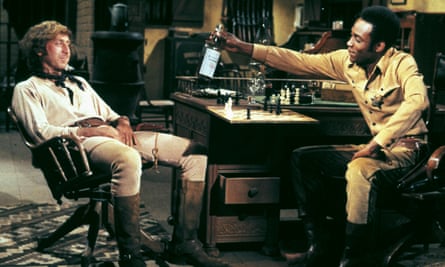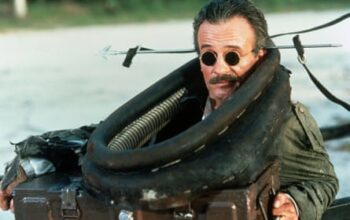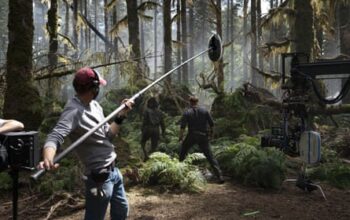T
While it may not be as commonly discussed as other iconic western films such as The Wild Bunch and McCabe and Mrs. Miller, Mel Brooks’s Blazing Saddles does not shy away from subverting the traditional narratives of the Old West. Unlike those artfully shot films, Blazing Saddles relies on comedic elements, such as a horse getting knocked out and a Native American chief (one of many roles played by Brooks) speaking Yiddish, to challenge the myth of the Wild West. From its opening scene, which depicts Chinese immigrants and recently freed Black slaves being mistreated by white settlers while building a railroad, this satirical parody takes a critical stance on life in the frontier, contrasting with the romanticized portrayals found in classic westerns.
Many people believe that Blazing Saddles, a popular movie, could not be made in today’s society due to its frequent use of the N-word. However, it’s important to note that the movie faced challenges during its production in 1974 for the same reason. In one scene, a white foreman asks Black workers to sing, comparing them to birds when they were slaves. The actor playing the foreman, Burton Gilliam, was uncomfortable using the word and apologized to star Cleavon Little, who reminded him of its negative connotations in the script. The N-word is used throughout the film as a harsh insult, just as it was 50 years ago and continues to be today. Little, who plays a clever character similar to Bugs Bunny in Brooks’s cartoon western, mocks anyone who uses the word.
Little’s Bart, expecting a somber spiritual like “Swing Low, Sweet Chariot” or the minstrel song “Camptown Races”, surprises his men with an anachronistic performance of Cole Porter’s “I Get a Kick Out of You”. This tune, considered modern in 1934, required alteration for the movie due to the line “some get a kick from cocaine”. However, in 1874, Bart entertains a group of racists by clowning around with a pushcart, even prioritizing rescuing the cart over himself and another Black laborer stuck in quicksand. For Brooks, the ability to freely move between different time periods allows for more opportunities to make jokes, such as the popular line “I must have killed more men than Cecil B DeMille”. It also highlights the fact that not much has changed in a century.
Previously, Brooks had tested this type of boldness with The Producers, his exceptional first comedy about a scheme to create a Nazi-inspired musical called Springtime for Hitler, known as the worst show in the history of Broadway. In Brooks’s opinion, the most effective way to confront human wickedness is to mock it, and although Blazing Saddles lacks the same unique concept as The Producers, it relies on the same spirited desire to incite. Brooks and his team of screenwriters, including Andrew Bergman (The In-Laws) and Richard Pryor, placed racial discord at the core of Blazing Saddles and playfully eased the tension.
Taking inspiration from classic westerns such as Once Upon a Time in the West, Blazing Saddles follows the story of a small town called Rock Ridge. When a train is rerouted through the town, it becomes a target for developers looking to profit from the railway line. To drive out the residents, the territorial attorney general (played by Harvey Korman) and his henchman (Slim Pickens) plot to kill the sheriff and replace him with Bart (played by Brooks), a Black man. They believe that this will cause outrage and make the town vulnerable to attack.
The welcoming committee is surprised when Bart arrives in town, but he finds a friend in Jim, also known as The Waco Kid, a drunk gunslinger who is sobering up in a jail cell. Played by Gene Wilder, Jim is much more relaxed and charming than his previous role as an anxious accountant in The Producers. He describes the people of Rock Ridge as simple and not very virtuous, calling them “morons.” If Bart cannot win them over, he will have no trouble pulling pranks on them.

In addition to Wilder and Korman, Brooks welcomed Madeline Kahn as a vital third member to his ongoing comedy group in the film Blazing Saddles. Kahn’s portrayal of Lili Von Shtupp, a German seductress hired to deceive and abandon the sheriff, is reminiscent of Marlene Dietrich with a touch of Elmer Fudd. Brooks wrote three songs for the film, one of the most notable being “I’m Tired,” a flashy burlesque number that is meant to entice men, but in reality, is a lament from a tired sex worker who is constantly bothered by persistent admirers.
Brooks’ first parody of the film industry, his iconic take on Universal monsters, Young Frankenstein, came out later that same year. In this spoof, Brooks not only pokes fun at the western genre, but also gives himself the freedom to break all the rules. His characters break the fourth wall, such as an elderly woman who momentarily pauses her own beating to ask the audience, “Have you ever seen such cruelty?” The movie also includes jokes about real-life figures like Randolph Scott, Jesse Owens, and even references to future individuals. In one scene, the film fast-forwards to Douglas Fairbanks’ star on the Hollywood Walk of Fame and questions how he managed to pull off such daring stunts with such small feet. By the end of Blazing Saddles, Brooks has completely blurred the line between the screen and the theater, as shown by Wilder casually enjoying a box of popcorn.
Despite the sharper edges of the film’s racial comedy, Brooks isn’t a rabble-rouser by nature. He’s more like Sheriff Bart, who wins over a hostile crowd by completely disarming them. So what if Blazing Saddles could never get made today? It still plays.
Source: theguardian.com


